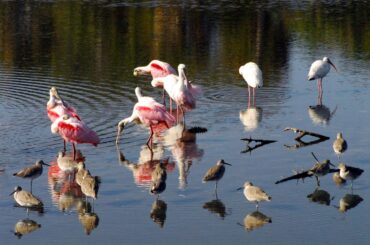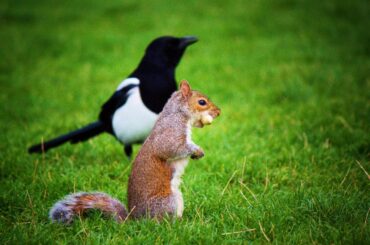Ever wondered if hawks take to the sky after the sun sets? Are these majestic birds nocturnal hunters or daytime predators? What’s the real story behind their nighttime activities?
You’re about to dive into an intriguing topic that has captivated bird enthusiasts for years. Do hawks hunt at night?
This question has sparked countless debates and discussions among bird lovers. While some swear they’ve seen hawks swooping down in the moonlight, others insist these birds are strictly daytime hunters.
Let’s unravel the myths and discover the facts about these fascinating creatures.
What is a Hawk?

Hawks are birds of prey with keen eyesight and powerful talons. Their sizes vary, yet many are medium to large.
Swooping down to catch prey, like mice and birds, is something they excel at. From the forests in North America to the deserts in Africa, these birds have a global presence.
Birdwatchers and nature enthusiasts frequently look for hawks. In the birdwatching world, the presence of these birds is significant. Their unique hunting skills and wide range make them exciting to watch. Whether in a city park or deep in the woods, spotting a hawk is always a thrill.
Nighttime Behavior of Hawks
Hawks mainly hunt during the day, but some species can be active at dusk. Their nighttime behavior often sparks curiosity and debate among birdwatchers.
Are Hawks Nocturnal?
No, most hawk species are not nocturnal, and they hunt primarily during daylight hours. Their sharp eyes work best in well-lit conditions, giving them a clear advantage in spotting and capturing prey. While some folks claim to have seen hawks hunting at night, these accounts often become misunderstandings or exaggerations.
A handful of hawk species might show some activity during twilight hours, but full-on nighttime hunting is not typical for these birds. To get a clearer picture, looking at the hawk’s daily activity patterns is essential.
These patterns reveal that hawks depend heavily on their superior vision for hunting. Daylight provides the optimal conditions for them to spot and catch their prey.
Be skeptical if you hear claims of hawks hunting in moonlight. Chances are, the bird in question wasn’t a hawk or belonged to a species active only at dawn or dusk.
Where Do Hawks Go at Night?
At night, hawks usually stay in their nests. These nests are often high up in trees or on cliffs, away from predators. The height gives them a good vantage point to spot any danger.
Nesting habits vary among hawk species, but safety is a common theme. Some hawks even build their nests near human activity, believing that predators will avoid these areas.
So, if you’re wondering where hawks go when the sun sets, look up and you might just find a nest in a tall tree or on a cliff edge.
Hawks take their nighttime rest seriously. They use this time to recover and prepare for another day of hunting. So, the next time you’re out at night, remember that these fascinating birds are likely tucked away, resting for their next daytime adventure.
Do Hawks Attack at Night?
Hawks rarely attack at night, preferring the daylight hours when their exceptional vision can be fully utilized. The dim light of nighttime doesn’t offer the clarity these birds need to identify and capture prey. This is why you’ll seldom hear hawks hunting after the sun goes down.
This nocturnal inactivity offers peace of mind for those who own small pets, like rabbits or chickens. Once the sun sets, the risk of a hawk attack drops significantly. Nighttime usually poses no hawk threat to your pets, unlike daytime hours when they’re more at risk.
Daytime is when you should take steps to protect your pets from hawks. For added safety, consider using covered enclosures. Understanding the hawk’s daytime hunting habits allows you to take effective steps to keep your pets safe.
When are Hawks Most Active?

Hawks prefer hunting when the sun’s up, especially during early mornings and late afternoons. This schedule matches that of their prey, making hunting more successful for them.
The morning and late afternoon light provides the ideal conditions for their keen eyesight to spot prey from high up in the sky.
This daytime activity is primarily due to their reliance on vision for hunting. Hawks have incredibly sharp eyesight, which allows them to detect even the slightest movements on the ground below.
So, if you’re interested in observing hawks or keeping your pets safe, concentrate your efforts during these peak hours. Whether you’re a birdwatcher with a keen eye or a pet owner looking to protect smaller animals, understanding when hawks are most active can be beneficial.
Do Hawks Come Out at Night?
Hawks usually stay put in their nests when it’s dark. After a day of hunting and flying, they use the nighttime to rest and recharge. While some species might be active during twilight, full-blown nighttime activity is not common among hawks.
The main reason you won’t see hawks at night is their dependence on good vision for hunting. Darkness compromises their ability to see clearly, making it challenging to spot prey. Unlike other animals adapted to nocturnal hunting, hawks are not equipped for low-light conditions.
So, if you’re taking a nighttime stroll and wonder if hawks might be around, the answer is probably no. These birds are resting up for the next day, tucked away in their nests.
Understanding this behavior can help you plan your bird-watching activities or take precautions to protect small pets when hawks are active.
Are Hawks Good to Have Around?

Yes, hawks are good to have around for several reasons. They help control the population of rodents and other small animals, acting as a natural form of pest control.
Hawks also add to the biodiversity of an area, making the ecosystem more robust and balanced. Their presence often indicates a healthy environment, which benefits other wildlife and even humans.
Birdwatchers and nature enthusiasts love spotting these majestic birds, learning about their behaviors, and photographing them. Their presence enhances the natural beauty and intrigue of any outdoor setting.
Final Thoughts
Hawks are genuinely unique creatures that deserve our attention and respect. Understanding the habits and behaviors of hawks enriches our appreciation for their role in ecosystems. They do more than just hunt; they contribute to the balance of nature. Learning about these birds of prey should be ongoing. We should not only appreciate but also protect them
FAQs
How Does a Hawk Fly?
A hawk uses its strong wings and keen eyesight to soar and dive, often catching prey mid-air.
What Does It Mean When You See a Hawk Flying at Night?
Seeing a hawk at night is rare and usually means the hawk might be one of the few species active at dusk.
Do Hawks Come Out at Night?
Generally, no. Hawks are daytime hunters and prefer to rest in their nests at night.





